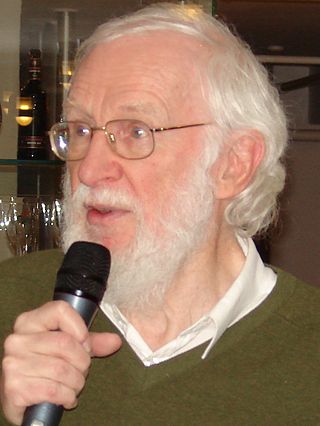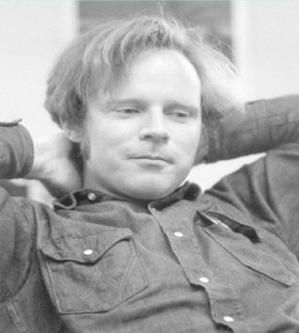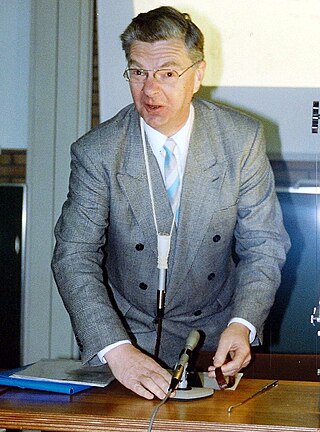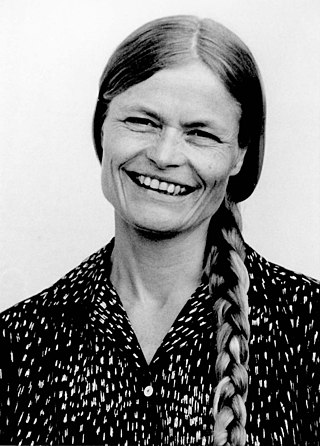This article needs additional citations for verification .(February 2021) |

Ivel Z3 was an Apple IIe compatible computer developed by Ivasim in 1980s. [1]
This article needs additional citations for verification .(February 2021) |

Ivel Z3 was an Apple IIe compatible computer developed by Ivasim in 1980s. [1]

Peter Naur was a Danish computer science pioneer and 2005 Turing award winner. He is best remembered as a contributor, with John Backus, to the Backus–Naur form (BNF) notation used in describing the syntax for most programming languages. He also contributed to creating the language ALGOL 60.

Stephen Richard "Steve" Bourne is an English computer scientist based in the United States for most of his career. He is well known as the author of the Bourne shell (sh), which is the foundation for the standard command-line interfaces to Unix.

Robert W. Floyd was an American computer scientist. His contributions include the design of the Floyd–Warshall algorithm, which efficiently finds all shortest paths in a graph and his work on parsing; Floyd's cycle-finding algorithm for detecting cycles in a sequence was attributed to him as well. In one isolated paper he introduced the important concept of error diffusion for rendering images, also called Floyd–Steinberg dithering. He pioneered in the field of program verification using logical assertions with the 1967 paper Assigning Meanings to Programs. This was a contribution to what later became Hoare logic. Floyd received the Turing Award in 1978.

John McCarthy was an American computer scientist and cognitive scientist. He was one of the founders of the discipline of artificial intelligence. He co-authored the document that coined the term "artificial intelligence" (AI), developed the programming language family Lisp, significantly influenced the design of the language ALGOL, popularized time-sharing, and invented garbage collection.

Peter John Landin was a British computer scientist. He was one of the first to realise that the lambda calculus could be used to model a programming language, an insight that is essential to the development of both functional programming and denotational semantics.
David A. Turner was a British computer scientist. He is best known for designing and implementing three programming languages, including the first for functional programming based on lazy evaluation, combinator graph reduction, and polymorphic types: SASL (1972), Kent Recursive Calculator (KRC) (1981), and the commercially supported Miranda (1985).
Brian Randell DSc FBCS FLSW is a British computer scientist, and emeritus professor at the School of Computing, Newcastle University, United Kingdom. He specialises in research into software fault tolerance and dependability, and is a noted authority on the early pre-1950 history of computing hardware.
The International Federation for Information Processing (IFIP) is a global organisation for researchers and professionals working in the field of computing to conduct research, develop standards and promote information sharing.

The Computer Conservation Society (CCS) is a British organisation, founded in 1989. It is under the joint umbrella of the British Computer Society (BCS), the London Science Museum and the Manchester Museum of Science and Industry.
Richard Simpson Bird was an English computer scientist.
CIPS is the professional association of IT professionals in Canada. Since 1958 CIPS has helped strengthen the Canadian IT industry by establishing standards and sharing best practices for the benefit of individual IT professionals and the sector as a whole. CIPS represents thousands of members across the country as Canada’s Association of Information Technology Professionals.

NUSSE was the first Norwegian electronic computer.
T. William Olle is a British computer scientist and consultant and President of T. William Olle Associates, England.
The American Federation of Information Processing Societies (AFIPS) was an umbrella organization of professional societies established on May 10, 1961, and dissolved in 1990. Its mission was to advance knowledge in the field of information science, and to represent its member societies in international forums.

Jeremy Gibbons is a computer scientist and professor of computing at the University of Oxford. He serves as Deputy Director of the Software Engineering Programme in the Department of Computer Science, Governing Body Fellow at Kellogg College and Pro-Proctor of the University of Oxford.

Michel Sintzoff was a Belgian mathematician and computer scientist.

Drude Elisabeth Berntsen is a Norwegian computer scientist who was director of the Norwegian Computing Center from 1970 to 1990. It was unusual for a woman to hold such a high-ranking position at a time of male dominance in computing.
Susan Bond, was a scientific officer and computer programmer for the Mathematics Division of the Royal Radar Establishment (RRE) in the United Kingdom. She worked extensively on the programming language ALGOL 68 and the Royal Radar Establishment Automatic Computer (RREAC), an early solid-state electronics, ICL 1907F computer.